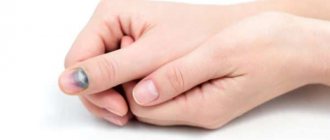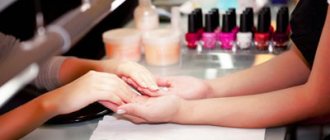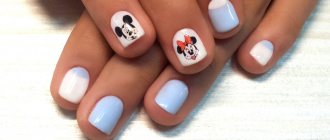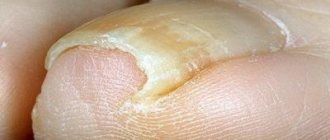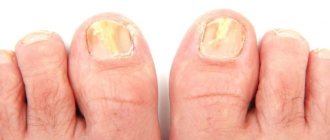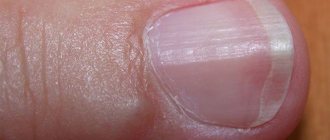Causes
Attacks of onychophagia can occur episodically under the influence of provoking factors or be present constantly. Interestingly, the habit of biting nails takes hold very easily. After all, situations where hands are near the mouth occur often. When we prop our heads up while sitting at the table, we think, we yawn.
Some of the reasons why people bite their fingernails include:
- Stress. When a person is nervous, this is how he tries to distract himself. Doing your nails gives you temporary peace of mind, relaxation and even pleasure;
- Concentration of attention. In moments of mental stress and reflection, a person unconsciously begins to bite his nails in an attempt to find a solution;
- Boredom. Sometimes a bad habit is provoked by banal boredom, when, while looking for something to do, a person suddenly comes across his own fingers;
- Psychical deviations. The habit can be a manifestation of obsessive-compulsive, oppositional defiant, major depressive disorder, Tourette's syndrome;
- Hunger. When people start biting their nails when they are hungry, it acts as a distraction.
Experts agree that there is no one universal cause of onychophagia. Rather, a complex of provoking factors is triggered. Some believe that the obsessive desire to bite nails has the same roots as the habit of pulling out hair, biting lips, picking skin, and belongs to the category of neuroses.
Why do adults bite their nails?
The desire to bite your nails is not a habit, but an obsessive state, which is a nervous disorder. The main reason is stress. People who are depressed try to switch gears and unknowingly cause themselves pain. For some, on the contrary, biting a nail helps them focus on the problem and find a solution.
The most common reasons include:
- stress: incessant nervous tension provokes neurosis, which in turn causes a desire to nibble pollen;
- Nervous tension: this condition is a manifestation of negative emotions. In this way, people relieve tension;
- mental illness: sometimes chewing hides more serious problems associated with a mental disorder. People with mental disorders can completely eat the nail plate. In this situation, only a psychiatrist can help;
- rumination: considered the most common cause among adults. Some people bite pens and pencils, while others chew their nails;
- anxiety: internal fear makes a person defenseless. He begins to seek protection and unconsciously bites his nails;
- childhood habits: almost all adults who have this problem suffered from it in childhood. If a child is not weaned from this habit, then he will continue to hurt himself in the hands of adults.
Regardless of the reasons that provoked the problem, it is necessary to consult a psychologist.
Why does a child bite his nails?
At 2, 3, 4 and 5 years old, 30% of children have the habit of biting their nails. One explanation for the reasons associates this with the extinction of the sucking reflex. Some babies find it difficult to cope with this period. Unconsciously trying to maintain the reflex, they begin to suck fingers or bite their nails. Especially in moments of stress or overexcitement.
Among adolescents, onychophagia occurs in 45% of boys and girls.
The habit helps children relieve stress, get distracted, or retreat into themselves during the following difficulties:
- uncertainty, low self-esteem, embarrassment;
- excessive demands on the child from parents, teachers or other adults;
- constant quarrels in the family, divorce, cases of domestic violence;
- negative assessment of the child’s behavior or appearance by friends or classmates;
- difficulties with the manifestation of negative emotions when children try to hide or suppress aggression within themselves;
- change of environment, moving, period of adaptation to kindergarten or school, death of a loved one;
- difficulties in communicating with peers, establishing friendships, isolation;
- the desire to be the best, to receive recognition and praise;
- excessive physical, emotional or mental stress.
With these problems, in addition to onychophagia, the child has moodiness, nervousness, sleep disturbances, and appetite. Apathy or aggressive behavior, sharp reactions to the actions of others are possible.
The reason that onychophagia is more common in children than in adults is that children are not aware of the norms of behavior and do not see anything terrible in it. For example, they pick their nose without hesitation in front of everyone. Whereas an adult is stopped by the fact of social condemnation. The same applies to the habit of biting nails in children.
Also, the reason why a child bites his fingernails may be in imitation of adults, older brothers or sisters. If a kid sees someone doing this, he will want to do it too, because the elders are an example and authority for him.
Many who suffer from onychophagia in childhood outgrow this bad habit as they grow older. But if you cannot overcome it, it persists for life.
Is it harmful to bite your nails?
The habit of biting your nails can cause many problems:
- ingrown nail. Constant exposure to the nail plate leads to a change in the direction of nail growth, which is why it can grow into the skin. Correcting the defect will take a lot of time, and advanced situations can only be resolved surgically;
- ruined manicure. Well-groomed and beautiful hands are the hallmark of a successful person. Uneven nails and hangnails on the hands are a sad sight. Applying decorative coatings to injured nails is not allowed due to the high risk of causing burns or allergies. This consequence is most unpleasant for women. For the opposite sex, unkempt female hands are a turning off factor;
Unfortunately, adults rarely seek psychological help, because it is difficult for them to admit their problem. The only thing that can help in such a situation is awareness of the consequences.
- problems with the gastrointestinal tract. A bad habit causes not only aesthetic problems. It can cause problems with the digestive system, ranging from indigestion to poisoning. This is due to the fact that a large number of pathogenic microorganisms accumulate under the nails. They gradually accumulate in the body and poison it;
- worms. People who bite their nails are at risk of contracting worms. A person can carry parasite eggs on his hands, and with insufficient hand hygiene, they enter the body through the mouth;
- fungus. Open wounds around the nail can harbor fungal spores. A fungal infection will join the main problems, and the recovery process will be long.
It is enough for an adult and reasonable person to realize the depth of one of these problems in order to forever get rid of the desire to bite the nail plate. But for more effective and successful treatment it is necessary to take an integrated approach.
Why do adults bite their nails?
According to statistics, onychophagia occurs to one degree or another in 15% of adults, and among women it is 3 times more common than among men.
According to a number of studies, it turned out that perfectionists are more prone to such a bad habit. If something does not go according to plan, then people striving for perfection get upset, nervous, and lose patience. And to cope with irritation, they bite their nails. And this applies not only to work, but also to personal, family life, relationships with friends.
Why do adults still bite their fingernails?
The reasons may be:
- Sudden nervous tension;
- Chronic stress;
- Feelings of fear and anxiety. In search of protection, adults return to childhood, remembering bad habits that helped cope with such conditions;
- Thinking about problems or important tasks. While people bite their nails, it is easier for them to concentrate and make decisions. Some people bite not their nails, but a pen cap or simply draw meaningless patterns on paper;
- Mental disorders that are accompanied by a desire to harm or injure oneself. Such people often chew their nails until they bleed, and may even eat the entire plate.
Why do people bite their nails: the psychology of the issue
Let's start with the fact that biting nails is not even a habit at all, but an obsessive state or obsession, which is classified as a neurosis by a number of Western medical associations. Biting nails, in essence, is the same as pulling out hair, scratching skin, biting lips, obsessive desire to wash hands, etc. Is it possible that the external manifestation of this problem does not look so repulsive and does not cause concern among others. Naturally, in this case we are talking about constant biting of nails, causing pain to oneself and traumatizing the plates and skin of the fingers, and not about the banal biting off of hangnails or a broken piece of nail.
Photo from the site: kakprosto.ru
So why do people bite their nails? The main reason lies in stress. As a rule, people experiencing stress try to distract themselves from the problem by unconsciously causing themselves pain. Or, on the contrary, chewing their nails, they focus on the problem and try to find some solution.
Let's look at the most common reasons for the habit of biting nails in adults:
- Nervous tension. Have you noticed how some people, trying to calm down anger or relieve tension, clench their fists until their knuckles turn white, or in a fit of rage they break objects and thus release negative emotions? It turns out that the reason for the habit of biting nails may have a similar picture, namely in this way a person tries to relieve tension.
- Stress. An oppressive, ongoing situation can provoke the appearance of neurosis, which manifests itself in biting nails.
- Anxiety. Fears and concerns force a person to “return to childhood.” In search of protection, people unknowingly begin to bite their nails. Moreover, they cannot even remember why they bit their nails.
- Rumination over a problem is perhaps one of the most common reasons why an adult bites his nails. Some people chew on a pen cap to concentrate on a task, some tear paper or draw insignificant diagrams on paper, and some simply bite their nails. It has been noticed that perfectionists, people who are constantly trying to achieve better results, are prone to this habit.
- A habit from childhood. As a rule, all adults who bite their nails suffered from this habit in childhood. If the child could not be distracted from the problem or acted with prohibitive methods, then sooner or later the adult returns to the addiction.
- Mental illnesses accompanied by a desire to harm or injure oneself. People suffering from mental illness often eat their nails into “meat” and tear off the entire plate. In this case, a person needs qualified help from a psychiatrist.
Interesting
Women are more prone to nail biting than men. Thus, among women this “predilection” is three times more common.
In all cases, with the exception of the last one, in order for a person to stop biting his nails, he should seek help from a psychologist, because you probably already noticed that in any case, the leading reason why a person bites his nails is psychological stress.
Why should you not bite your nails or bite off hangnails?
First of all, it's unhygienic. A person who bites his nails causes hostility and condemnation from others. Secondly, onychophagia is a habit that is dangerous to health.
Leads to the following complications:
- Deformation, thinning, delamination of the nail plate, inflammation, suppuration of the skin around the nail;
- Entry into the oral cavity of pathogenic pathogens that are located in the area under the nails and on the fingertips. As a result, a person becomes infected with gastrointestinal infections, suffers from indigestion or poisoning with a high fever;
- Fungus (onychomycosis). Injury to the nail area by bites and a humid environment create favorable conditions for the penetration and proliferation of fungus, which leads to deterioration of the condition of the nails and even their loss;
- Dental problems. The habit causes inflammation of the gums, damage to teeth (chips, displacement, destruction), dysfunction of the temporomandibular joint;
- Ingrown nail. With constant gnawing, the direction of growth of the plate changes, which leads to its ingrowth into the lateral nail folds.
Why else is it harmful and should not bite your nails? Their main function is to protect the end phalanges of the fingers from mechanical damage. If the integrity of the plate is violated, the nail bed will become vulnerable and easily injured.
How to get rid of the habit of biting your nails?
- If you notice that your baby is biting the nails on his little hands, you should never hit his hands. It is necessary to understand the reason why a child bites his nails, and try to occupy the child’s hands with useful activities that calm and distract. You can color a picture together or put together a mosaic.
- Girls who bite their nails can be offered a beautiful children's manicure. They will be proud of it and will not spoil it. You can also recommend covering your nails with varnish, which is produced to prevent nail biting. It has a bitter taste. You can buy varnish at a pharmacy.
- People who bite their nails are advised to regularly trim their nails short to avoid the temptation to chew that treasured tip.
A child bites his nails - this is an SOS signal!
QUESTION My son is 3 years and 3 months old. Over the past six months, he has developed a habit of biting his nails, sometimes right down to the flesh. I've been told that this happens when children are nervous or afraid of something. I want to say that the child has also become capricious. If earlier in my absence he behaved normally, he was not, of course, quiet, but he did not cry for no reason. But when I came home from work, whims began almost immediately. And now crying and whims for any reason. I tried not to pay attention - the child did not calm down. I try to hug him and calm him down, but it doesn’t always help. He starts waving his arms at me and spitting. Sometimes I even start to get nervous myself. Maybe I'm doing something wrong? How to stop your son from biting his nails?
ANSWER
If a 3-year-old child bites his nails down to the flesh, then this is a reason to consult a neurologist. And if at the same time you also notice hysterical states, aggression (often unmotivated), then you need to find out the cause of the problem as soon as possible together with a neurologist. Understand the main thing: you do not need to wean your child from biting his nails, but find out why he bites his nails. After all, this “stupid habit” of his is actually nothing more than an SOS signal! Any “stupid habit” of the baby like thumb or hair sucking, pulling his ear, and so on - all this indicates that the child is not comfortable! Something is bothering him! So it is useless to simply stop biting your nails. First of all, we look for the reason.
Don't blame all your problems on yourself. It’s a mistake to say: I’m doing something wrong, I’m a bad mom!
Neurosis in children at this age is often a projection of parental relationships. Your letter does not mention your father. If you and the boy’s dad do not have a very good relationship for some reason, and the boy lives with you, with his mother, then YOUR reaction to what is happening is very important.
WHAT TO DO
1. Do not apply mustard. Do not focus the child on the nails, do not focus attention on the fact that he is biting his nails. It's not about the nails. He has no control over his actions now. Therefore, when we “dunk” a child’s head into his guilt, he only gets worse. “I’m bad,” the kid thinks. “I’m doing bad.” But he cannot NOT do it. So all the “grandmother’s” methods of dealing with a bad habit (smearing mustard, hitting your hands, scaring you with a doctor and dirt and germs) will not work, but will only do harm.
2. There should be peace at home. A home is a fortress for a child. This is the place where he feels good, calm, where there is stability and predictability. It is important that there is no swearing at home. It’s good if mom always returns from work at the same time. The child waits and knows that she will come for dinner.
It is important that home traditions emerge that form a stable “WE” in his head. For example, sit down to dinner with your child. Watch a children's show together, bake cookies together.
3. Hugs Well done for hugging your son! The child misses you, so try to stroke and kiss him as much as possible. And do not forget that you need to hug a child who is worried about something not only when he is naughty or crying, but also at any other time. It’s great if, when putting the baby to bed, the mother gives him a massage with warm and soft hands. You don't have to learn this, you just need simple gentle strokes. And at this moment, convey to the baby thoughts about how much you love him. You'll be surprised how magically it works! 4. Games and fairy tales. I also really need bedtime stories. Read, come up with your own ideas. But the main thing is that all fairy tales end well. Play tactile games that help relieve stress - sort through rice, play with cereals, beans, beads. 5. Don't be afraid of whims. It's good that you try to feel sorry for him when he acts up. But you can’t let your son have everything. A confident mother should be next to him: if she said “no”, then no! If it’s “not possible”, then it’s not possible. Refuse and argue as gently as possible, but don’t indulge!
ANECDOTE ON THE TOPIC Mother shows the child the statue of Venus de Milo: - Here! Look! If you bite your nails, you will become like this aunt!
Send your questions to psychologist Amir Tagiyev at


